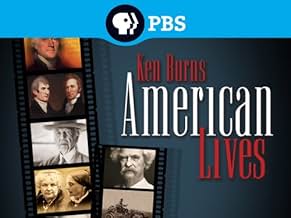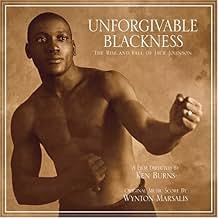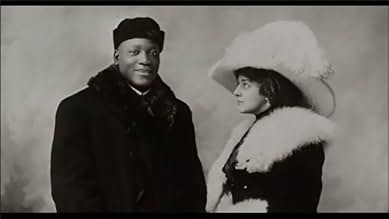CALIFICACIÓN DE IMDb
8.3/10
1.8 k
TU CALIFICACIÓN
Agrega una trama en tu idiomaThe story of Jack Johnson, the first African-American Heavyweight boxing champion.The story of Jack Johnson, the first African-American Heavyweight boxing champion.The story of Jack Johnson, the first African-American Heavyweight boxing champion.
- Ganó 3 premios Primetime Emmy
- 4 premios ganados y 5 nominaciones en total
Jack Johnson
- Self
- (material de archivo)
José Torres
- Self - Former Light Heavyweight Champion
- (as Jose Torres)
W.C. Heinz
- Self - Sportswriter
- (as W. C. Heinz)
Keith David
- Narrator
- (voz)
- Dirección
- Guionista
- Todo el elenco y el equipo
- Producción, taquilla y más en IMDbPro
Opiniones destacadas
As the author of a biography about Canadian heavyweight champion Tommy Burns, I can tell you Unforgivable Blackness didn't tell the whole story by portraying Tommy as a racist who had to be badgered into fighting Jack Johnson. Until Tommy Burns came along, all the heavyweight kings had been white Americans who openly drew the so-called 'colour line,' refusing to fight blacks. Tommy, who fought seven African-American boxers on his way up, announced the day that he won the title that he would take on all comers, regardless of race or religion. Among other things, Tommy Burns did the following: * Break the colour line by becoming the first white champ to fight a black boxer (Jack Johnson). * Become the first champ to give a Jewish boxer (Joseph Smith) a crack at the title. * Married a black woman. * Hire two black sparring partners. * Befriend and socialize with black fighter Billy Woods. Tommy Burns was a racist by the standards of 2007, often using the 'n' word in interviews. But by the standards of his era, he was a very progressive individual. And although director Ken Burns doesn't acknowledge it in his otherwise very good film, if it wasn't for Tommy Burns, no one alive today would know or care who Jack Johnson was. Dan McCaffery, author, Tommy Burns: Canada's Unknown World Heavyweight Champion
Those looking for a sports documentary will be keenly disappointed. By relying on a ridiculously small number of commentators and sources, Ken Burns has put together a four hour indictment of white America for its past racism and intolerance. The sources not only are limited in number but only one of them--he late Burt Sugar--could claim real familiarity with boxing. And never was there anyone so in love with sound of his own voice. The man simply cannot shut up.
The rest all are far-left hacks like Village Voice journalist Jack Newfield or like Stanley Crouch racial militants with nothing relevant to contribute but with a heavy political agenda leading to some very warped judgments about the era in which Jack Johnson lived and the man himself.
While Jack Johnson was a great heavyweight, a real genius inside the ring, outside of it he was in no way the icon of racial struggle he is portrayed as here. Any comparisons to Muhammad Ali are far off base.
Mike Tyson is the closest parallel with, below the waist, some Tiger Woods into the bargain, and while professional boxing recovered from Jack Johnson with great sportsmen like Gene Tunney and Joe Louis to later hold the title, Tyson has left such a bad smell that the prize ring probably will never recover its former luster.
The rest all are far-left hacks like Village Voice journalist Jack Newfield or like Stanley Crouch racial militants with nothing relevant to contribute but with a heavy political agenda leading to some very warped judgments about the era in which Jack Johnson lived and the man himself.
While Jack Johnson was a great heavyweight, a real genius inside the ring, outside of it he was in no way the icon of racial struggle he is portrayed as here. Any comparisons to Muhammad Ali are far off base.
Mike Tyson is the closest parallel with, below the waist, some Tiger Woods into the bargain, and while professional boxing recovered from Jack Johnson with great sportsmen like Gene Tunney and Joe Louis to later hold the title, Tyson has left such a bad smell that the prize ring probably will never recover its former luster.
I saw this film at the 2004 Toronto International Film Festival. It may seem hard to believe, but I've never seen a Ken Burns film. I've always meant to, of course, but watching a multi- part documentary series is something of a commitment. So I jumped at the chance to see an entire film in one sitting. Clocking in at an impressive 218 minutes (and including a short intermission and a lively Q&A session, I was in the theatre for almost 4½ hours), I was hoping that the quantity would be matched by the quality. I was not disappointed.
Jack Johnson was a true original. The first black man to hold the heavyweight boxing championship, he was a self-assured man who dressed well, drove fast cars, and kept white women as girlfriends. While not unusual now, this was highly irregular a hundred years ago, at a time when black lynchings were at their peak and the press regularly printed offensive cartoons to go along with its racist rhetoric. In the ring, he was a highly intelligent boxer, favouring a defensive style unknown in his day. He was also incredibly sensitive and articulate, especially for a man with only five years of formal education. But the struggles Johnson faced were almost insurmountable. No white champion would agree to fight a black man. Jim Jeffries preferred to retire undefeated rather than face Johnson, and Johnson had to travel around chasing champ Tommy Burns, hounding him to give him a title shot. When Burns finally agreed to a fight in 1908 (for a purse of $35,000, an unbelievable sum in those days), the contest wasn't even close, with Johnson dancing around, taunting his opponent, and talking to people in the ringside seats. The police stepped in during the fourteenth round to prevent him from knocking out the badly beaten Burns.
Johnson held the title from 1908 until 1915, with his most famous bout in 1910, against ex- champ Jeffries, whom he soundly defeated. This led to race riots all over the country, and many people were killed. From the moment he won the championship, it seemed that white society looked for ways to discredit him. The press were relentless, printing hostile editorials and calling for a "Great White Hope" who would return boxing's crown to its rightful place (and race). When a 37-year old Johnson finally lost the championship to Jess Willard, a giant man ten years his junior, it seemed to many that the black race had been taught an important lesson.
Johnson's life was troubled, and he continued to face persecution from the press and even law enforcement, who prosecuted him on charges related to his "debauchery" with white women. He eventually served a year in prison. There would not be another black heavyweight champion until Joe Louis, 22 years later.
This is a remarkable film for many reasons. First of all, in the little-known story of Jack Johnson, Burns has found a microcosm of the racial situation of the day, and one that has many echoes even now. Muhammad Ali, after seeing James Earl Jones portray Johnson in the Broadway play "The Great White Hope" (later made into a film), declared that Johnson's life story was similar to his own. A black man choosing to live as a free individual on his own terms is something that is still hard for some white people to tolerate.
Burns' film is also remarkable for the way in which it uses actual archival film of Johnson's bouts. Using silent film, Burns and his crew have added sound effects such as crowd noise and the sounds of blows connecting, and it gives these scenes the visceral punch they require. Finally, the superb "talking heads" (including the late George Plimpton, James Earl Jones, and the witty Stanley Crouch) and voice talent (Samuel L. Jackson is the voice of Johnson; others include Billy Bob Thornton, Derek Jacobi, Brian Cox, and Alan Rickman) bring the extraordinary story of Jack Johnson vividly to life.
As an added bonus, you get to hear James Earl Jones say "balls". Twice.
(9/10)
Jack Johnson was a true original. The first black man to hold the heavyweight boxing championship, he was a self-assured man who dressed well, drove fast cars, and kept white women as girlfriends. While not unusual now, this was highly irregular a hundred years ago, at a time when black lynchings were at their peak and the press regularly printed offensive cartoons to go along with its racist rhetoric. In the ring, he was a highly intelligent boxer, favouring a defensive style unknown in his day. He was also incredibly sensitive and articulate, especially for a man with only five years of formal education. But the struggles Johnson faced were almost insurmountable. No white champion would agree to fight a black man. Jim Jeffries preferred to retire undefeated rather than face Johnson, and Johnson had to travel around chasing champ Tommy Burns, hounding him to give him a title shot. When Burns finally agreed to a fight in 1908 (for a purse of $35,000, an unbelievable sum in those days), the contest wasn't even close, with Johnson dancing around, taunting his opponent, and talking to people in the ringside seats. The police stepped in during the fourteenth round to prevent him from knocking out the badly beaten Burns.
Johnson held the title from 1908 until 1915, with his most famous bout in 1910, against ex- champ Jeffries, whom he soundly defeated. This led to race riots all over the country, and many people were killed. From the moment he won the championship, it seemed that white society looked for ways to discredit him. The press were relentless, printing hostile editorials and calling for a "Great White Hope" who would return boxing's crown to its rightful place (and race). When a 37-year old Johnson finally lost the championship to Jess Willard, a giant man ten years his junior, it seemed to many that the black race had been taught an important lesson.
Johnson's life was troubled, and he continued to face persecution from the press and even law enforcement, who prosecuted him on charges related to his "debauchery" with white women. He eventually served a year in prison. There would not be another black heavyweight champion until Joe Louis, 22 years later.
This is a remarkable film for many reasons. First of all, in the little-known story of Jack Johnson, Burns has found a microcosm of the racial situation of the day, and one that has many echoes even now. Muhammad Ali, after seeing James Earl Jones portray Johnson in the Broadway play "The Great White Hope" (later made into a film), declared that Johnson's life story was similar to his own. A black man choosing to live as a free individual on his own terms is something that is still hard for some white people to tolerate.
Burns' film is also remarkable for the way in which it uses actual archival film of Johnson's bouts. Using silent film, Burns and his crew have added sound effects such as crowd noise and the sounds of blows connecting, and it gives these scenes the visceral punch they require. Finally, the superb "talking heads" (including the late George Plimpton, James Earl Jones, and the witty Stanley Crouch) and voice talent (Samuel L. Jackson is the voice of Johnson; others include Billy Bob Thornton, Derek Jacobi, Brian Cox, and Alan Rickman) bring the extraordinary story of Jack Johnson vividly to life.
As an added bonus, you get to hear James Earl Jones say "balls". Twice.
(9/10)
As a youngster I heard about this man Jack Johnson. Even then I thought those same stories were fiction. Afterall, no one could convince me that, in the early 1900's a black, Negro, could have possibly conducted his life in such a way to disdain social mores not only to the degree in and of itself, but more so in his audacity.
Marrying and dating white women?? Come on. And he did not get killed? It shows that even for those times, America had this certain elasticity in dealing with a unique personality such as Johnson's.
This movie weaves his life thoughtfully, slowly (a 2 disc set after all) and with dignity. The voices that contributed to this story is so widely varied that I implore you to check the movie's credits. From Ed Harris, Kevin Conway, Samuel L. Jackson and the lead narrator, Keith David. But these voices aren't the complete range of contributors. For this kind of talent to come together is a testament to the power of the story and the pull that director Ken Burns commands.
Unforgivable Blackness ... is a powerful, thought provoking part of the American Experience. To that end, PBS deserves continued credit for bringing history to the masses.
Humbly Submitted and with deep emotions, Ron W.
Marrying and dating white women?? Come on. And he did not get killed? It shows that even for those times, America had this certain elasticity in dealing with a unique personality such as Johnson's.
This movie weaves his life thoughtfully, slowly (a 2 disc set after all) and with dignity. The voices that contributed to this story is so widely varied that I implore you to check the movie's credits. From Ed Harris, Kevin Conway, Samuel L. Jackson and the lead narrator, Keith David. But these voices aren't the complete range of contributors. For this kind of talent to come together is a testament to the power of the story and the pull that director Ken Burns commands.
Unforgivable Blackness ... is a powerful, thought provoking part of the American Experience. To that end, PBS deserves continued credit for bringing history to the masses.
Humbly Submitted and with deep emotions, Ron W.
Ken Burns has done an amazing documentary on the life of Jack Johnson -but even more amazing is the story he tells of the times in which Johnson lived. There is still racism in this country, for sure - one wants to believe that at least in most parts of the country, it is a little more circumspect than racism was during Johnson's life. This documentary provides a truly astounding look at this country at the beginning of the century, and a lot of it is unattractive. Johnson, called "The Ethiopian," could not go after the heavyweight title because the white fighters swore no black man would ever have it. When he finally did get it, Jim Jefferson, the undefeated champion, who had refused to fight Johnson, was dragged out of retirement 10 years and 100 pounds later to try to reclaim the title. He failed, and commented that in his prime, he could never have beat Johnson.
In his belief system, Johnson came up against a contemporary, Booker T. Washington, who believed that, rather than worry about segregation, blacks should build a power, education, and money base first. Johnson preferred to live as if segregation did not exist. He lived in white neighborhoods, moved his mother into one, flaunted his money, and consorted with white women. His quest for individualism cost him dearly. He bucked a system that simply would not stand for it.
This is a fascinating piece of our history, one that should not be missed.
In his belief system, Johnson came up against a contemporary, Booker T. Washington, who believed that, rather than worry about segregation, blacks should build a power, education, and money base first. Johnson preferred to live as if segregation did not exist. He lived in white neighborhoods, moved his mother into one, flaunted his money, and consorted with white women. His quest for individualism cost him dearly. He bucked a system that simply would not stand for it.
This is a fascinating piece of our history, one that should not be missed.
¿Sabías que…?
- TriviaIt is stated that as a young man Johnson would sometimes "ride the rails" to find bouts in other towns.This does not mean buying a train ticket. The rails referred to are the iron foot rails attached to the underneath of boxcars by the sliding doors, that served as a footstep. Attached at the ends, with a crossbar at the center, one would lay down on their back and hold on, with a bedroll or rolled-up clothes serving as a cushion under the back.
- Citas
Jack Johnson: I have found no better way in avoiding race prejudice than to act with people of other races as if prejudice did not exist.
- ConexionesFeatured in Ken Burns: America's Storyteller (2017)
- Bandas sonorasGhost in the House
Composed and Performed by Wynton Marsalis
Selecciones populares
Inicia sesión para calificar y agrega a la lista de videos para obtener recomendaciones personalizadas
- How long is Unforgivable Blackness: The Rise and Fall of Jack Johnson?Con tecnología de Alexa
Detalles
- Fecha de lanzamiento
- País de origen
- Sitios oficiales
- Idioma
- También se conoce como
- Непростительная чернота: Взлеты и падения Джека Джонсона
- Locaciones de filmación
- Minneapolis, Minnesota, Estados Unidos(Minnesota)
- Productoras
- Ver más créditos de la compañía en IMDbPro
- Tiempo de ejecución
- 3h 34min(214 min)
- Color
- Mezcla de sonido
- Relación de aspecto
- 16 : 9
Contribuir a esta página
Sugiere una edición o agrega el contenido que falta



















